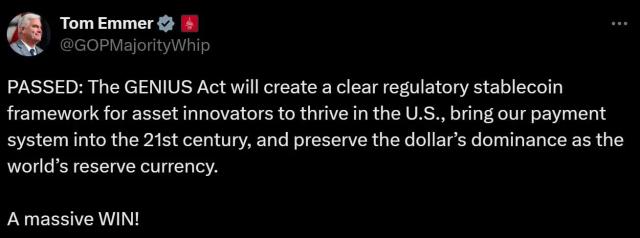Original Title: 《Q2 2025 Asia Web3 Market Recap: From Policy to Practice》
Author: Tiger Research Reports
Translated by: TechFlow
TL;DR
Regulation and Government: 1) Hong Kong will introduce stablecoin legislation in August to consolidate its digital financial center status. 2) Singapore implements a strict licensing system, prohibiting unlicensed companies from operating overseas. 3) Thailand launches G-Tokens, becoming the first country to issue government-backed digital bonds.
Corporate Dynamics: 1) Japanese listed companies ride a Bitcoin fund strategy wave, driving institutional investment surge. 2) Chinese enterprises adopt a pragmatic approach, circumventing domestic restrictions through Hong Kong licenses and hoarding Bitcoin.
Policy Shifts: 1) In South Korea, a won-backed stablecoin emerges as a post-election agenda, offset by ongoing regulatory fragmentation. 2) Vietnam achieves a historic transformation from ban to full legalization. 3) The Philippines pursues a dual-track strategy, combining strict regulation with a sandbox framework.
1. Asia Web3 Market in Q2: Regulatory Stabilization and Increasing Corporate Investment
[The rest of the translation follows the same professional and accurate approach, maintaining the original structure and meaning while translating into English.]The scope of digital financial services has also significantly expanded. The Securities and Futures Commission (SFC) announced plans to allow professional investors to conduct virtual asset derivatives trading. Meanwhile, licensed exchanges and funds are permitted to provide Staking services.
These developments reflect the clear intent of regulators to establish a more comprehensive and institution-friendly digital asset ecosystem in Hong Kong.
2.4. Singapore: Regulatory Tightening between Control and Protection

Source: MAS
In the second quarter, Singapore took significant tightening measures in cryptocurrency regulation. Most notably, the Monetary Authority of Singapore (MAS) comprehensively banned unlicensed digital asset companies from operating overseas, indicating a firm stance against regulatory arbitrage .
The new regulations apply to all entities providing digital asset services to global users in Singapore, effectively mandating formal licensing. The environment has changed: simple business registration is no longer sufficient to maintain operations.
This change has put increasing pressure on local Web3 companies. They now face a binary choice—either establish a fully compliant, operational entity or consider moving to more lenient jurisdictions. While aimed at enhancing market integrity and consumer protection, its impact on early-stage and cross-border projects is undeniably limited.
2.5. China: Digital Yuan Internationalization and Enterprise Web3 Strategies
In the second quarter, China advanced the internationalization of the digital yuan, with Shanghai at the center of this effort. The People's Bank of China announced plans to establish an international operations center in Shanghai to support cross-border applications of the digital currency.
However, a gap still exists between official policy and actual practice. Despite a nationwide ban on cryptocurrencies, reports suggest that some local governments (such as Jiangsu Province) have liquidated seized digital assets to cover fiscal shortfalls, indicating a pragmatic approach that differs from the official stance.
Chinese enterprises have also demonstrated a similar pragmatic spirit. Companies like logistics group AdanTex have begun to follow Japanese enterprises in increasing Bit holdings. Other companies are using Hong Kong's licensing system to bypass mainland restrictions and enter the global Web3 market—effectively breaking through regulatory boundaries to participate in the digital asset economy.
Market interest in yuan-pegged stablecoins has also grown, especially in the latter half of this quarter. Concerns about the dominance of USD stablecoins and RMB depreciation have fueled these discussions.
On June 18, People's Bank of China Governor Pan Gongsheng publicly elaborated on a vision for a multipolar global monetary system, suggesting an openness to stablecoin issuance. In July, Shanghai's State-owned Assets Supervision and Administration Commission initiated discussions on developing a yuan-pegged stablecoin.
2.6. Vietnam: Cryptocurrency Legalization and Enhanced Digital Control
Vietnam officially announced the legalization of cryptocurrencies in the second quarter, marking a significant policy shift. On June 14, Vietnam's National Assembly passed the Digital Technology Industry Law, which recognizes digital assets and outlines incentives for areas like artificial intelligence, semiconductors, and digital infrastructure.
This marks a historic reversal of Vietnam's cryptocurrency ban, potentially making the country a catalyst for widespread cryptocurrency adoption in Southeast Asia. Given Vietnam's previous restrictive stance, this represents a significant adjustment in cryptocurrency policy in the region.

Simultaneously, the government has intensified control over digital platforms. Authorities ordered telecommunications operators to block Telegram, citing the app's alleged involvement in fraud, drug trafficking, and terrorist activities. A police report found that 68% of its 9,600 active channels were related to illegal activities.
This dual approach—legalizing cryptocurrencies while cracking down on digital abuse—reflects Vietnam's intent to allow innovation within strict monitoring. While digital assets are now legally recognized, their use in illegal activities is facing more stringent law enforcement.
2.7. Thailand: State-Led Digital Asset Innovation
In the second quarter, Thailand advanced government-led initiatives in the digital asset domain. The Securities and Exchange Commission (SEC) announced that it is reviewing a proposal to allow exchanges to list their own utility Tokens—a departure from previous strict listing rules, promising to enhance platform operational flexibility.
More notably, the Thai government announced plans to issue national digital bonds . On July 25, Thailand will issue "G-Tokens" through an approved ICO platform, with a total issuance of $150 million. These Tokens will not be usable for payment or speculative trading.
This move is a rare example of direct government participation in digital asset issuance. Globally, Thailand's approach can be seen as an early example of public sector-led tokenized financial digital innovation.
2.8. Philippines: A Dual-Track Approach of Strict Regulation and Innovation Sandbox
In the second quarter, the Philippines implemented a dual-track strategy combining stricter regulation with support for cryptocurrency innovation. The government imposed more stringent controls on Token listings, with regulatory authority shared between the central bank and the U.S. Securities and Exchange Commission (SEC). Registration and anti-money laundering compliance requirements for Virtual Asset Service Providers (VASPs) were also significantly relaxed.
A particularly noteworthy measure was the introduction of influencer regulatory provisions. Content creators promoting crypto assets must now register with relevant authorities. Violations could result in penalties up to five years in prison, making it one of the strictest enforcement regimes in the region.
In addition to these measures, the government launched a framework to promote innovation. The SEC began accepting applications for "StratBox", a sandbox program designed to support crypto service providers in a controlled regulatory environment.





